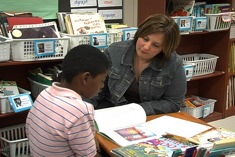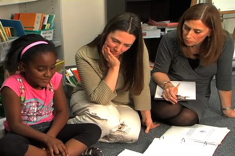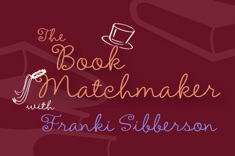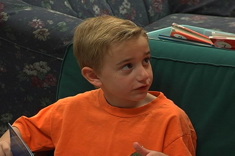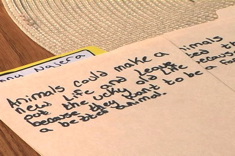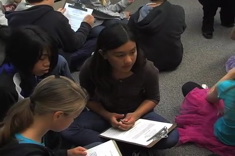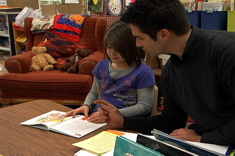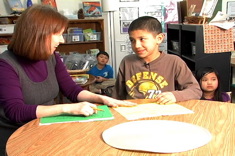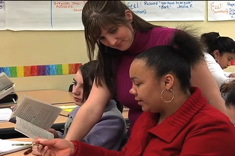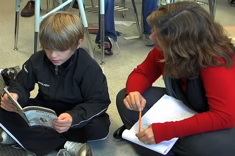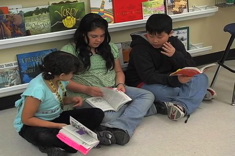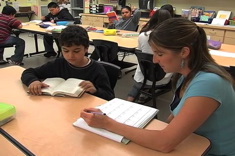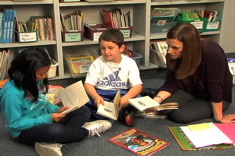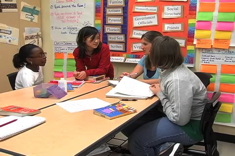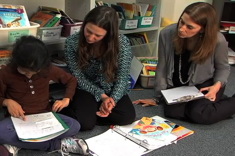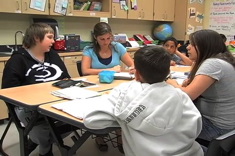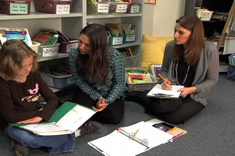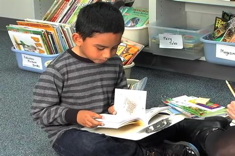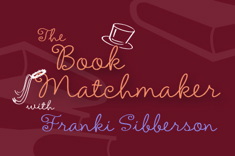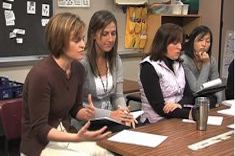Videos
Here is where you’ll find all the latest videos from our contributors. These videos are all captured in classrooms with crews using multiple cameras during regularly scheduled reading and writing workshops.
Latest Content
Accuracy and Comprehension: Conferring in Second Grade
In this video from Sean Moore’s second-grade classroom, Sean confers with a student who comprehends text well but has some issues with accuracy.
Conferring with Vita: Working Through Silence
Andie Cunningham confers with Vita, an English language learner whose first language is Russian. Vita is in the silent period. Notice how Andie coaxes communication from Vita, and manages to convey a sense of delight at her work, an acknowledgment of Vita’s importance in the classroom community, and some guidance for future writing.
Listen In: About the Author
“About the Author” blurbs are a great way to bring closure to writing in workshops. In this “Listen In,” Myia begins to construct her “About the Author” page.
Listen In: Writing Reviews
Heather Rader uses Kincaid’s intricate system for analyzing books to build a writing agenda in this writing conference.
Quick Take: “The Sisters” on Writing Journals
In this two-minute Quick Take video, Gail Boushey and Joan Moser (“The Sisters”) talk about the importance of having “Small Moments” and “Happenings” sections in student writing journals.
Next-Read Stack: Conferring for Independence
Franki Sibberson explains the value of "Next-Read Stack" conferences for fostering independence, and includes a video example.
Sixth-Grade Lesson: Editing for Conventions
In this lesson with her sixth graders, Pam Pogson talks about a goal many students have mentioned during writing conferences: editing for conventions. This brief lesson gives everyone a chance to brainstorm common errors and fixes.
Over the Top: Mystery Writing with Fourth Graders
Helping students navigate the boundaries between realistic fiction and fantasy can be tricky, especially when it comes to mystery writing. In this lesson from Beth Lawson’s fourth-grade classroom, Beth uses a top hat graphic to help students think through when writing is “over the top” in mysteries.
Listen In: Maya is a Chapter Writer
Some young writers take a lot of time and encouragement on the journey to uninhibited prose, while others zip to prolific. Maya is such a writer. Heather Rader assists this proficient 2nd grade writer as her teacher observes.
Book Matchmaker: Texts for Young English Language Learners
Franki Sibberson shares some of her favorite new titles for young English language learners.
Fluency in Focus: Conferring with Jake
Gail Boushey confers with Jake, a seven-year-old who is setting a reading goal of developing fluency. After the conference, she debriefs with Joan Moser.
Conferring About Thesis Statements
In this conference with a 4th grader, Beth Lawson talks about supporting details for thesis statements. This is part of the video series from Beth’s room on essay writing.
The Sponge Summary Lesson Part 5
In this sequence of videos, Heather teaches a 4th grade class, using the analogy of a sponge to explain how summaries work. In this fifth video, Heather and students shift from “I do” to “we do” as students try test their summary writing skills with partners
Conferring About Chunking Words in Second Grade
Sean Moore confers with a 2nd grader who is learning the strategy of chunking words in reading. Notice how Sean focuses the student, refers to previous conferences, and previews an upcoming whole-class reading.
The Sponge Summary Lesson Part 6
In this sequence of videos, Heather teaches a 4th grade class, using the analogy of a sponge to explain how summaries work. In this final video, Heather and students debrief and capture their learning in writing.
Stuck on a Thesis: Conferring
In this conference with a 4th grader, Beth Lawson works with a student who has chosen a challenging essay topic and is struggling to develop his thesis.
“And Then and Then and Then”: Moving Students from Retelling to Thoughtful Response
Katie Doherty confers with sixth grader Kristina during reading workshop. Kristina is new to the classroom, and Katie demonstrates how to gently move a student from retelling to more thoughtful responses to literature with a few simple and carefully worded questions.
Stop and Track: Conferring with a Fifth-Grade Reader
In this conference with a 5th grader, Aimee Buckner shares two strategies — one to use when putting a book away between readings, and another to help keep track of characters in a complex narrative where the point of view is constantly shifting.
Middle School Book Clubs: Introduction
Katie Doherty explains why she has book clubs with her 6th grade students.
Conferring with Tweens: Boys and Series Books
In this conference from a 6th grade classroom, Katie Doherty confers with a boy who is reading a book from a series she is unfamiliar with – watch how she engages the child to learn about the series and refocus the discussion on skills and goals.
Guiding Reading Partners: Work on Accuracy
In this reading conference from a 2nd grade classroom, Linda Karamatic pairs two children who have similar needs in reading.
Middle School Book Clubs: Response Options
Students have different response options in Katie Doherty’s sixth grade book clubs.
Listen In: Writing in Math
Heather Rader confers with 2nd grader Maya about her math writing as Linda Karamatic listens in.
Middle School Book Clubs in Action
Katie Doherty talks about the links between strategy lessons and book club work in her 6th grade classroom. Katie also sits in on a book club discussion.
Listen In: Knowing When You’re Done
When is writing finished? Heather Rader confers with a second grader over that age-old question for writers as Linda Karamatic listens in.
Listen In: XBox Game Writing
Boys and their toys: Heather Rader confers with a second grader over his game writing while Linda Karamatic listens in.
Narrative Nonfiction in 5th Grade Part 2
In this lesson from a 5th grade classroom, Aimee Buckner guides students in a note-taking process to help understand the qualities of nonfiction narrative writing. In this second part of the lesson, students share their notes and Aimee makes connections to additional mentor texts.
Words and Images: Mentor Texts for Second Grade Boys
In this conference with two of her second-grade students, Linda Karamatic shares mentor texts and tips to help them with their writing. Both boys are writing stories with strong visual components.
Book Matchmaker: Picture Book Biographies
Franki Sibberson shares some of her favorite picture book biographies in the latest installment of Book Matchmaker.
Literacy Team Meeting: Focus on Word Work Part 2
In the second part of the literacy team meeting, teachers on the team move from the focus on sharing, to the important phase of where to go next as a team and as a school. Because the crucial work of the team is the work done between meetings, this is a critical discussion.
Browse Content By
Type
Category
- Assessment Tools
- Big Fresh Archives
- Booklists
- Choice Numeracy
- Classroom Design
- Common Core
- Community Building
- Conferring
- Content Literacy
- Digital Literacy
- English Language Learners
- Equity
- Family Relations
- Free Samples
- Guiding Groups
- Leadership
- Literacy Coaches
- Mentor Texts
- Minilessons
- New Teacher Mentors
- Podcasts
- Poetry
- Quote Collections
- Reading Strategies
- Self Care
- Struggling and Striving Learners
- Talking and Listening
- Teacher Study Groups
- Teaching Reading
- Teaching Writing
- Word Study and Vocabulary
Author
- Melissa Quimby
- Nawal Qarooni
- Gwen Blumberg
- Julie Cox
- The Lead Learners
- Hannah Tills
- Josie Stewart
- Ruth Metcalfe
- Mallory Messenger
- Becca Burk
- Jodie Bailey
- Vivian Chen
- Mary Brower
- Tiffany Abbott Fuller
- Stephanie Affinito
- Ruth Ayres
- Leigh Anne Eck
- Heather Fisher
- Shari Frost
- Julie Johnson
- Suzy Kaback
- Gigi McAllister
- Shirl McPhillips
- Melanie Meehan
- Cathy Mere
- Debbie Miller
- Tara Barnett and Kate Mills
- Tammy Mulligan
- Dana Murphy
- Bitsy Parks
- David Pittman
- Brenda Power
- Heather Rader
- Matt Renwick
- Mandy Robek
- Christy Rush-Levine
- Gretchen Schroeder
- Jen Schwanke
- Brian Sepe
- Katherine Sokolowski
- Stella Villalba
- Jennifer Vincent
Grade Level
Choice Literacy Membership
Articles
Get full access to all Choice Literacy article content
Videos
Get full access to all Choice Literacy video content
Courses
Access Choice Literacy course curriculum and training






